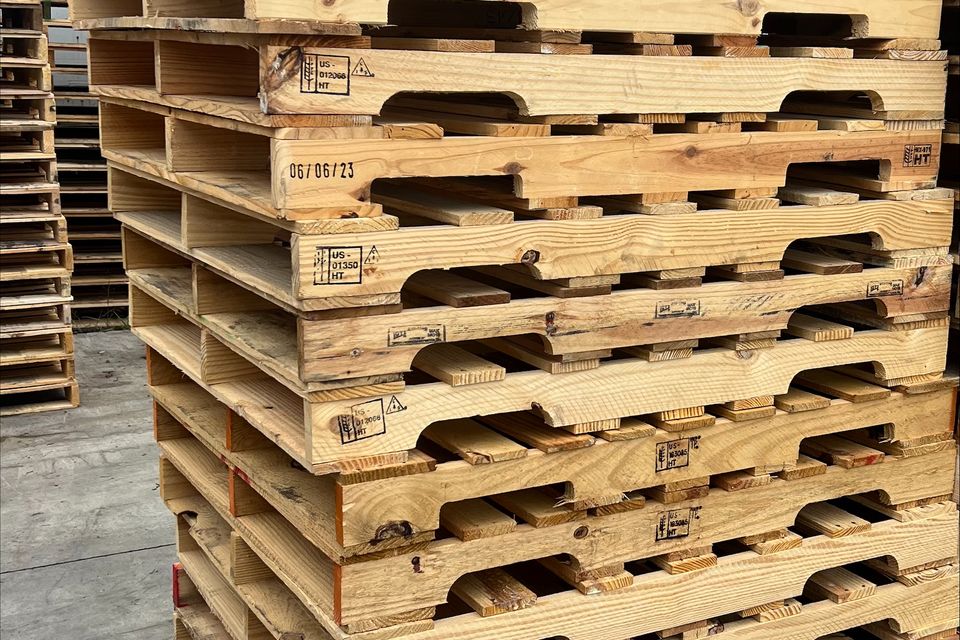
Is A Recycled/Repaired Pallet More Affordable?
Recycled or repaired pallets can be more affordable than brand-new pallets in many cases. The cost savings of using recycled or repaired pallets typically stem from the fact that they have already been used and are being repurposed, which can reduce the initial manufacturing and material costs. Here are a few reasons why recycled or repaired pallets can be more affordable:
Reduced Material Costs: Recycled pallets are made from reclaimed wood or other materials, which are often less expensive than new materials. Repairing damaged pallets also involves using less new material, further reducing costs.
Lower Labor Costs: The labor costs involved in repairing or refurbishing pallets are generally lower than those for manufacturing new pallets from scratch.
Competitive Market: The market for recycled or repaired pallets is often competitive, which can lead to lower prices as pallet suppliers vie for your business.
Sustainability and Environmental Benefits: Using recycled or repaired pallets aligns with sustainability goals and can sometimes lead to cost savings through environmentally friendly practices.
However, it's essential to consider a few factors when deciding whether to use recycled or repaired pallets:
Quality: The quality of recycled or repaired pallets may vary. Some pallets may have limited lifespan or structural integrity, depending on how well they've been repaired or maintained.
Usage Requirements: The intended use of the pallets matters. For heavy or specialized applications, new pallets may be necessary for safety and durability.
Regulations and Standards: Ensure that the recycled or repaired pallets meet any regulatory or industry-specific standards that apply to your business.
Maintenance Costs: Over time, recycled or repaired pallets may require more maintenance and repairs than new pallets.
In summary, recycled or repaired pallets are generally more affordable upfront, but their suitability depends on your specific needs, quality requirements, and long-term considerations. To make an informed decision, it's crucial to evaluate the costs, quality, and intended use of the pallets in your particular situation.
Reduced Material Costs: Recycled pallets are made from reclaimed wood or other materials, which are often less expensive than new materials. Repairing damaged pallets also involves using less new material, further reducing costs.
Lower Labor Costs: The labor costs involved in repairing or refurbishing pallets are generally lower than those for manufacturing new pallets from scratch.
Competitive Market: The market for recycled or repaired pallets is often competitive, which can lead to lower prices as pallet suppliers vie for your business.
Sustainability and Environmental Benefits: Using recycled or repaired pallets aligns with sustainability goals and can sometimes lead to cost savings through environmentally friendly practices.
However, it's essential to consider a few factors when deciding whether to use recycled or repaired pallets:
Quality: The quality of recycled or repaired pallets may vary. Some pallets may have limited lifespan or structural integrity, depending on how well they've been repaired or maintained.
Usage Requirements: The intended use of the pallets matters. For heavy or specialized applications, new pallets may be necessary for safety and durability.
Regulations and Standards: Ensure that the recycled or repaired pallets meet any regulatory or industry-specific standards that apply to your business.
Maintenance Costs: Over time, recycled or repaired pallets may require more maintenance and repairs than new pallets.
In summary, recycled or repaired pallets are generally more affordable upfront, but their suitability depends on your specific needs, quality requirements, and long-term considerations. To make an informed decision, it's crucial to evaluate the costs, quality, and intended use of the pallets in your particular situation.
